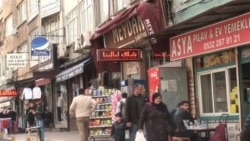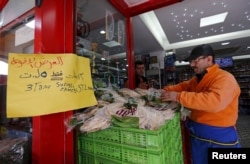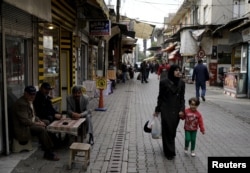The Aksaray district of Istanbul, with its small cheap hotels and boarding houses, is a traditional gathering place for exiles from the region’s crises. Afghans, Iranians and Iraqis all have sought refuge here at one time or another. These days it's Syrians, and the area already is being called “Little Damascus.”
The air on the streets is heavy with the scent of aromatic spices — in particular cinnamon, synonymous with Syrian cuisine.
The Mandi restaurant opened two-and-a-half years ago. A photo on the wall shows the owners' old restaurant in Syria, closed by the war. Istanbul has been good to them, said Isan Abdi, now a co-owner of three restaurants. But Abdi confessed that the language barrier was difficult, along with conservative tastes.
"In the beginning, the language of Turkish was very difficult," he said. "But then Turkish people and the Turkish government helped us. Now Syrian people came here, Iraqi people, and from Africa, and eastern Asia, Thailand, Philippines. All of them like rice. But it's a new food for Turkish people. ... Delicious, but I don't think they want to try a new thing."
Little Damascus is not only about restaurants. It's also home to many businesses. Abdulkadir Tarhan moved his food-processing factory from Syria across the border to Gaziantep in Turkey, and he now runs his enterprise from Istanbul, which has links to all of the Arab world. Tarhan said many Syrian businessmen find Istanbul an ideal base.
“There are various sorts of businesses — restaurants, real estate or tourism," he said. "Many people from Aleppo work in the manufacturing business. Turkey has recognized that there are 10,000 to 12,000 Syrian companies which are officially licensed in Turkey, working legally."
Jobs are scarce
But many Syrians are struggling to survive. A few minutes' walk from Tarhan’s office is a public square where thousands of Syrians are usually milling around, passing the time and dreaming about moving on, farther into Europe.
Mustafa, one of the Syrian refugees, said there's no work, and "Syrians have no life here in Istanbul."
Food and rent are expensive, so "everyone is going to Germany or Bulgaria," Mustafa said. Syrians have a very difficult life in Istanbul, he added, and when there is work, it is very hard. Mustafa said he works 12 to 14 hours a day, sometimes until 2 a.m.
But for many Syrians, restaurateur Abdi said, Europe is no paradise, either.
"First, yes, they think it is a heaven there," he said. "[They think] they will sit and [the Europeans] will give them money. It’s not like that. They must work, most of them."
Turkey is now giving Syrians free health insurance along with work permits. But with unemployment over 10 percent, the competition to find work is only becoming more difficult. So the allure of Europe still beckons to Syrians, whatever risks they must take to get there.







